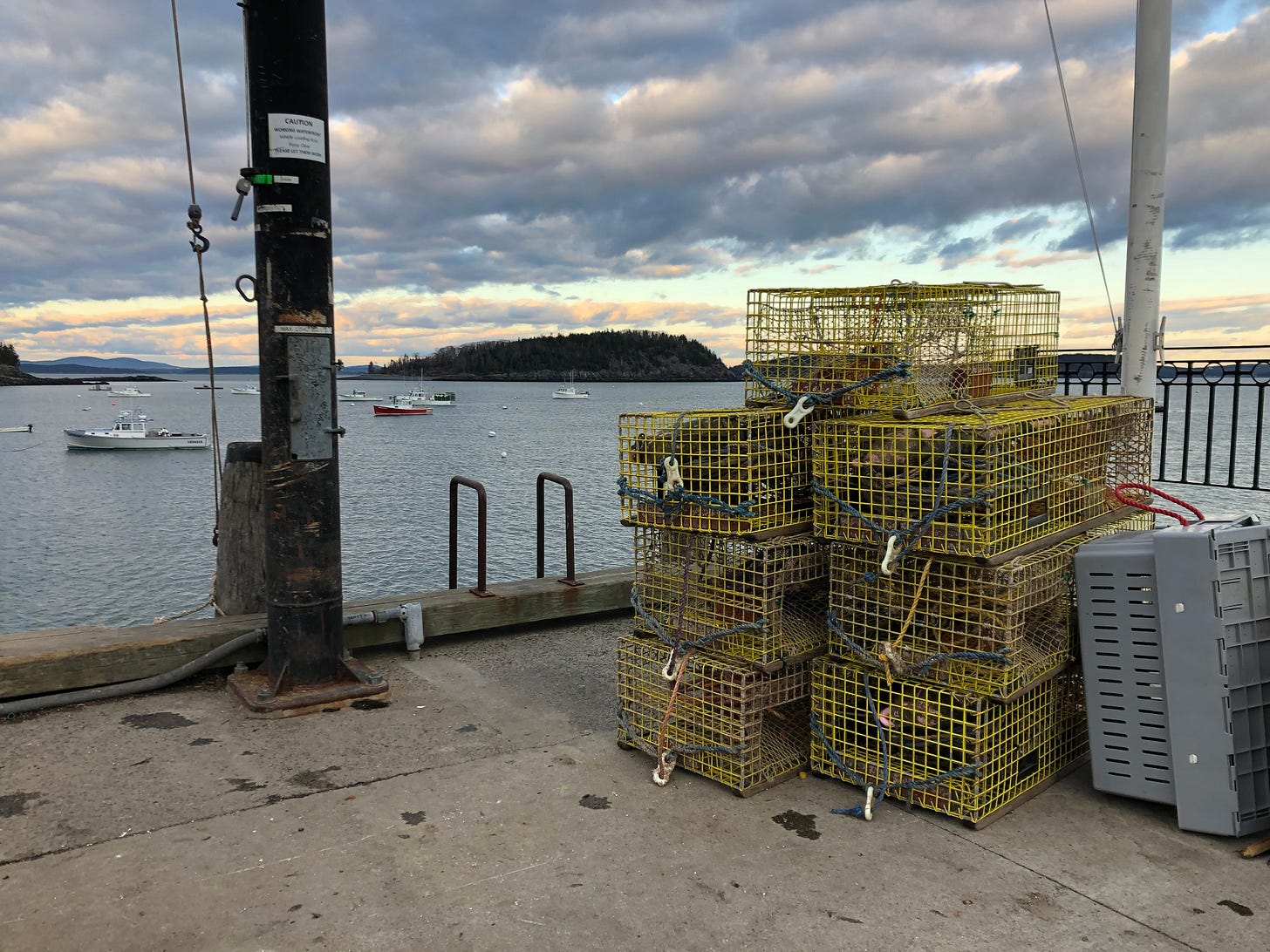Voters in Bar Harbor Slap Limits on Rentals
Welcome to The Sunday Morning Post! Each week I write about the economy, finance, and real estate. Click Subscribe below to get researched, ad-free content in your inbox each Sunday morning. Subscribing is free. Thanks for being here and thanks for reading.
Election Day 2021 has come and gone and while this was an off-year election (i.e. no presidential or gubernatorial races at least in most states), there were still a variety of other items on the ballot including here in Maine, where voters rejected the construction of a utility power corridor in the western area of the state and voted to enact a constitutional right to food.
There were also municipal races for town councils and school boards plus a variety of local referendum questions. One such question was on the ballot in Bar Harbor, where a majority of voters chose to enact new restrictions on rental property activity in the town. Per Bill Trotter in the Bangor Daily News:
By a 1260-840 tally, voters agreed to create two categories of vacation rentals — one for rentals at an owner’s primary residence that would have a minimum 2-night stay, and another for rentals at non-owner occupied residences that would have a minimum 4-night stay.
By the same vote, the town restricted non-owner occupied vacation rentals to zones that currently allow commercial and lodging activities.
Another aspect of this referendum is that the number of permitted vacation rentals will be limited to 9% of the overall housing stock. Any currently permitted units will be grandfathered in, but when a property is sold in the future the permit for nightly rentals will not be transferred, which is meant to steadily draw down the number of vacation rentals from its current state to what supporters of the referendum believe to be a more appropriate and sustainable level. According to the Mount Desert Islander, more than 25% of the housing units in Bar Harbor are now at least partially used as vacation rental properties and the number has been “climbing fast,” so this referendum is meant to halt the trajectory and steadily bring the number of units down through the attrition of property sales in the years (and perhaps even decades) to come.
These new local regulations are significant and will fundamentally impact the Bar Harbor real estate market. How did they come up? Well, I spoke to several residents of Bar Harbor this past week and their collective feeling was that people who call Mount Desert Island home have become tired of their neighborhoods turning into a haphazard mix of permanent residents, long-term rentals, and nightly AirBNB’s. In the words of one person I spoke with, “People are tired of having a different neighbor every night of the summer.”
Acadia National Park (and vicariously, Bar Harbor) is one of the ten most visited national parks in the country and welcomes over 3.5 million people per year. Per MaineBiz, the numbers of visitors to Acadia has increased by 60% over the past decade. All of those people have to stay somewhere. While Bar Harbor is home to numerous hotels, traditional B&B’s, and campgrounds representing thousands of nightly stays, interest among consumers has also risen for AirBNBs and other vacation rentals. This is a result of evolving consumer preferences, a more technologically savvy generation of travelers coming of age, and the marketing done by companies like AirBNB and Vrbo to grow their market shares.
It has become very profitable for homeowners on Mount Desert Island including Bar Harbor to rent their homes in the summer. There is robust demand and rates are quite high, sometimes $600, $800, and even $1,000+/night in peak season. According to Maine Public, “The number of registered units in [Bar Harbor] has grown from more than 400 two years ago to about 640 today, with another 150 properties in the application process.”
Amid this frenzy, I can understand the concerns of local residents who are seeing the character of their neighborhoods change as properties convert from long-term personal residences that are sometimes owned by the same person or family for decades to a mix of rentals and AirBNB’s. And I can understand the concerns of workers, business owners, and other residents who have seen long-term rental units converted into nightly stays, which can be more profitable to the property owner than renting out a unit on a month to month or yearly basis, but pushes out actual residents including the thousands of seasonal workers who are necessary to keep the Bar Harbor economy afloat in the summer.
*Bonus Content: read Lincoln Millstein’s Substack column, The Quietside Journal, on this same topic. Lincoln, a retired media executive, has been covering local politics and other happenings in Bar Harbor/MDI on his own in recent years. He now publishes regularly on Substack:
The trend towards vacation rentals also has far-reaching implications for the local school system. According to sources I found online in researching this article, the number of students at MDI High School in 2011 was 571, but today it is 527, a decrease of 7.7% in ten years. I have to think the sharp growth in properties that have converted to vacation rentals during that time period is directly linked to the reduction in the number of students at the local high school not to mention the fact that property values on Mount Desert Island have soared in the last ten years, effectively squeezing out a good number of potential young families who would otherwise want to live there.
So What Comes Next?
There could be legal challenges to the restrictions that were just passed in Bar Harbor, but time will tell. If the rules do stay in place, the trajectory of residential properties converting to vacation rentals will soon be halted as soon as soon as the regulations go into effect, which is scheduled to be December 2nd.
Predictions for what this means for Bar Harbor home values would vary based on who ask. Certainly one of the main motives for the referendum was to cool the sizzling rise in home values in Bar Harbor in recent years, which has been squeezing out a lot of people. Some supporters of the referendum might say, however, that these changes will actually help to stabilize Bar Harbor’s residential neighborhoods as prospective homeowners will have more certainty that their neighborhood is likely to remain primarily residential as opposed to landing among the steady creep of vacation rentals that many parts of Bar Harbor have experienced over the past few years.
Opponents might say the opposite, that the new rules will remove a whole swath of demand among property buyers as the very profitable activity of renting out a property as a vacation rental will no longer be allowed for properties that are not already grandfathered in. For a Bar Harbor homeowner looking to sell, there are suddenly fewer potential buyers as the investor class of homeowners will no longer be able or interested in buying Bar Harbor homes.
The more far-reaching impacts, however, could be felt as other communities look to the restrictions that were just passed in Bar Harbor and perhaps try to emulate them. Here in Maine alone there has already been discussion about limiting vacation rentals in communities like Portland and in other touristy hot-spots along the coast.
While on the surface this could smack of NIMBYism, government regulations are necessary when there is a market failure, and the failure represented by the rise of vacation rentals is that there is not enough housing for residents, workers, and others who make up the year-round lifeblood of a community. Amid roaring demand for visiting Maine’s coast over the last ten years, which was only heightened by the COVID-19 pandemic as Maine has been correctly perceived as a particularly safe place, the steady trend of properties converting from permanent residences and long-term rentals to nightly stays is not sustainable for the culture and lifeblood of the communities themselves, which is what a majority of Bar Harbor voters seemed to conclude last week. The legal challenges and copycat ordinances in other communities around Maine and perhaps beyond will be worth monitoring in the months and years ahead to see if policymakers and voters at the ballot box follow Bar Harbor’s lead.
Ben Sprague lives and works in Bangor, Maine as a V.P./Commercial Lending Officer for Damariscotta-based First National Bank. He previously worked as an investment advisor and graduated from Harvard University in 2006. Ben can be reached at ben.sprague@thefirst.com or bsprague1@gmail.com. Follow Ben on Twitter, Facebook, or Instagram and subscribe to this weekly newsletter by clicking below.
Author’s Note: no Weekly Round-Up this week as Election Day 2021 also had implications for your writer as I myself was elected to the Bangor School Committee. I am proud of the victory and grateful to the voters of Bangor. And now I am eager to get to work for the students, parents, teachers, and staff here in Bangor for the next three years. Also elected with me was Sara Luciano, who has some great ideas and positive energy and I am looking forward to working with her and the others existing members of the committee. I spent post-Election Day catching up on some family time. Check back next week for an extended Weekly Round-Up!

One funny and perhaps eye-opening thing to note, in researching this article I did some internet searching for vacation rentals in Bar Harbor to get a feel for the market. A few hours later these back-to-back emails popped into my inbox. The algorithms know everything!
Have a great week, everybody.



